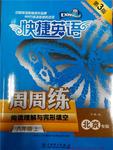题目内容
Writing a long book seemed to be too much for me. So, for a long time, I just wrote short articles. One day, inspiration(灵感) for an article hit me and, as I started writing, paragraphs began flowing out fast. It turned out to be too long to be an article. I thought it would not hurt to try self-publishing a booklet(小册子). The first printing of this 32-page black and white booklet sold out within a week. Here is something that I have learned through my experience.
1.Start small.
Don’t try to have a 400-page work as your first publication. I suggest you publish a booklet under 50 pages to launch your career as an author.
2.Ask for advice.
If you know some people who have published something, ask them for advice and help. You will gain useful information from them and save yourself many problems.
3.
When you put your heart into something only to hear“We’re not interested”,you may get hurt. But you must remind yourself that this is quite common. Every“yes”you receive comes after at least five“noes”,especially at the beginning. You need to revise your book many times to reduce the chances of being turned down.
4.The more you market, the more you sell.
You can publish an excellent book. But if no people know about it, you cannot expect many buyers. Send out an e-mail to friends, family and business partners, telling them your book’s publication date. Ask them to help sell your book.
Do not be afraid to try novel ideas.
1.What does the underlined word“launch”in Point 1 there mean?
|
A.Begin. |
B.Develop. |
C.Lead. |
D.Describe. |
2.What’s the best title for Point 3?
|
A.No one will like what you wrote at first. |
|
B.You will get hurt by what you wrote at first. |
|
C.Prepare for a“yes”rather than a“no”. |
|
D.Be prepared to deal with“noes”. |
3.According to the passage, if you want to have more copies of your book sold, you should .
|
A.advertise your book in newspapers |
|
B.try to make more people know your book |
|
C.ask your business partners to buy your book |
|
D.write something that people are interested in |
4.About self-publishing a book, the writer would most probably agree that .
|
A.one usually makes no money out of self-publishing a book |
|
B.one should never self-publish a book longer than 400 |
|
C.self-publishing a book is impossible for most people |
|
D.asking advice from people who have published a book is helpful |
1.A
2.D
3.B
4.D
【解析】
试题分析:
1.A 推理题。根据本句I suggest you publish a booklet under 50 pages to launch your career as an author.以及第二段主题Start small.说明是要我们从小规模做起。故该词指开始的意思。故A正确。
2.D 段落大意题。本段的中心思想是告诉我们该如何处理别人对我们的拒绝。故D正确。
3.B 推理题。根据倒数第二段第2句But if no people know about it, you cannot expect many buyers.说明如果人们不了解这本书,就不要期待着有读者。那么就是指要想多卖书,就得让更多的人知道这本书。故B正确。
4.D 细节题。根据第三段If you know some people who have published something, ask them for advice and help. You will gain useful information from them and save yourself many problems.说明向那些曾经出版过书的人求助对你是有很大帮助的。故D正确。
考点:考查人生百态类短文阅读
点评:本文是作者在写作以及卖书方面的经历以及他给那些写书的人的一些建议。文章内容较为简单,要求考生仔细阅读文本,耐心审题,结合题目做出准确的定位判断。

 快捷英语周周练系列答案
快捷英语周周练系列答案O。Henry wasa pen name used by an America writer of short stories.His real namewas WilliamSydney
【小题1】People enjoyed reading O. Henry’s stories because
| A.they had surprise endings | B.they were easy to understand |
| C.they showed his love for the poor | D.they were about New York City |
| A.people thought he had stolen money from the newspaper |
| B.he broke the law by not using his own name |
C.he wanted to write stories about prisoners |
| D.people thought he had taken money that was not his |
| A.He was well-educated. | B.He was not serious about his work. |
| C.He was devoted to the poor. | D.He was very good at learning. |
| A.His life inside the prison. | B.The newspaper articles he wrote. |
| C.The city and people of New York. | D.His exciting early life as a boy. |
A young woman carrying a three-year-old child got on a bus. The conductor (售票员)hurried to give her a warm welcome and then kindly asked the other passengers to make more room for the woman and her child. On seeing this, people began to talk. "You know this conductor used to be very rude. Now suddenly he has changed his bad behavior(行为) , "said a middle-aged man.
"Yes, he should be praised and we must write a letter to the company," said a second passenger. "That's right," another lady said, "I wish a newspaper reporter were here so that more people could learn from this conductor. "
Just then a gentleman who looked like a teacher turned to the conductor and said , "Excuse me, but can I know your name, please? Your excellent service must be praised..."
Before he could open his mouth, the three-year-old child sitting on the young woman's lap(大腿) interrupted, "I know his name. I call him Dad."
【小题1】The passengers were ________ to see the conductor's kindness to the woman and the child.
| A.excited | B.pleased | C.interested | D.surprised |
| A.make a demand for more buses |
| B.thank the conductor for his good service |
| C.criticize the conductor for his rude behavior |
| D.invite a newspaper reporter to write about the conductor |
| A.the gentleman | B.the conductor |
| C.the middle-aged man | D.the three-year-old child |
| A.has changed his attitude towards his work |
| B.has now been kind and polite to all passengers |
| C.has not changed his rude behavior to passengers |
| D.has now been kind and polite to women with children |